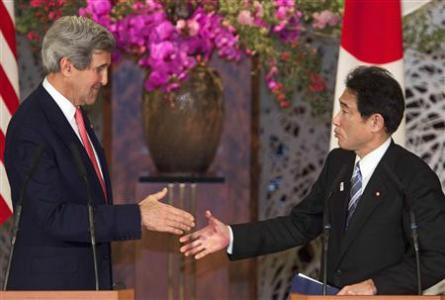Kerry Open To New North Korea Talks

The United States and Japan on Sunday offered new talks with North Korea to resolve the nuclear confrontation, but said the reclusive state first must lower tensions and honor previous agreements.
North Korea will find "ready partners" in the United States if it follows through, U.S. Secretary of State John Kerry told reporters in Tokyo. Japanese Foreign Minister Fumio Kishida, who appeared with Kerry at a news conference, was firmer, saying North Korea must honor its commitment to earlier deals regarding its nuclear and missile programs and on returning kidnapped foreigners, the Associated Press reported.
"I think it is really unfortunate that there has been so much focus and attention in the media and elsewhere on the subject of war, when what we really ought to be talking about is the possibility of peace. And I think there are those possibilities," said Kerry, according to Reuters. He was on the final leg of his Asian trip after visiting South Korea and China.
On Saturday, Kerry was in Beijing and pledged along with the Chinese to seek a peaceful resolution of the situation in. Gaining China's commitment, Kerry said, was no small matter given Beijing's long close ties to Pyongyang.
Tension on the Korean Peninsula has reached its highest levels in 60 years with North Korea's tests of a nuclear device and intercontinental ballistic missile technology, and its increasingly brazen threats of nuclear strikes against the United States. U.S. and South Korean officials believe the North may deliver another provocation any day now with a mid-range missile test.
"The question," Kerry said, "is what steps do you take now so we are not simply repeating the cycle of the past years." That was a clear reference to the various negotiated agreements and U.N. Security Council ultimatums that North Korea has violated since the 1990s.
"We have to be careful and thoughtful and frankly not lay out publicly all the options," Kerry said in what could be heard as a threat.
Kerry said the U.S. would defend both its allies, Japan and South Korea, at all cost. He also clarified a statement he made Saturday in Beijing, when he said the U.S. could scale back its missile-defense posture in the region if North Korea goes nuclear-free. It appeared to be a sweetener to coax tougher action from China, which has done little over the years to snuff out funding and support for North Korea's weapons of mass destruction program. China fears the increased U.S. military presence in the region may be directed at it as well.
Kerry said America's basic force posture wasn't up to debate. "There is no discussion that I know of to change that," he said. But he said it was logical that additional missile-defense elements, including a land-based system for the Pacific territory of Guam, deployed because of the Korean threat could be reversed if that threat no longer existed.
"There's nothing actually on the table with respect to that. I was simply making an observation about the rationale for that particular deployment, which is to protect the United States' interests that are directly threatened by North Korea," Kerry said.
The Pentagon in recent weeks has announced plans to position two Aegis guided-missile destroyers in the western Pacific and a Terminal High Altitude Area Defense missile defense system to Guam.
"The president of the United States deployed some additional missile defense capacity precisely because of the threat of North Korea. And it is logical that if the threat of North Korea disappears because the peninsula denuclearizes, then obviously that threat no longer mandates that kind of posture. But there have been no agreements, no discussions, there is nothing actually on the table with respect to that," Kerry said.
Pyongyang, which was preparing to celebrate the birth date of state founder Kim Il-Sung on Monday, reiterated it had no intention of abandoning its atomic arms programs.
"We will expand in quantity our nuclear weapons capability, which is the treasure of a unified Korea ... that we would never barter at any price," Kim Young-nam, North Korea's titular head of state, told a gathering of officials and service personnel applauding Kim Il-Sung.
The KCNA news agency also rejected as a "cunning trick" South Korean President Park Geun-hye's suggestion last week of holding talks with the North.
The South Korean capital, Seoul, displayed the calm it has shown throughout the crisis, Reuters reported. Residents strolled in bright sunshine a day after the city's World Cup stadium was jammed with 50,000 mostly young fans of "Gangnam Style" rapper Psy.
© Copyright IBTimes 2024. All rights reserved.





















